(完整)高中英语直接引语与间接引语讲义
高一英语直接引语和间接引语精品PPT课件
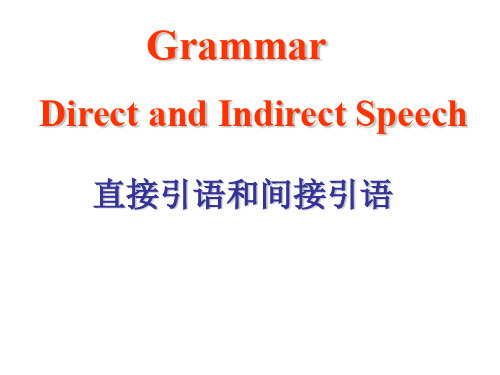
一般疑问句
•间接引语用连词whether或if引导,原主句中 谓语动词said要改为asked(me/him/us等), 语序是陈述句的语序
• He said, “Do you have any difficulty with pronunciation?”
• He asked (me) whether/if I had any difficulty with my pronunciation.
高考链接
3. Father went to his doctor for ___B____ about his heart trouble.
A. an advice
B. advice
C. advices
D. the advices
解析:答案B。Advice若作“忠告,劝告,
建议”讲,无论什么情况下都不可数,故
now, today this week yesterday
then, that day that week
the day before
last week the week before
four days ago four days before
yesterday
the day before
the day before yesterday
would, could, had better, would rather, might, must, ought to, used to, need时
Exercises:
1. He said , “I m afraid I can’t finish this work.” He said that he was afraid he couldn’t finish that work. 2.He said , “I haven’t heard from him since May.” He said that he hadn’t heard from him since May.
高中英语直接引语和间接引语讲解
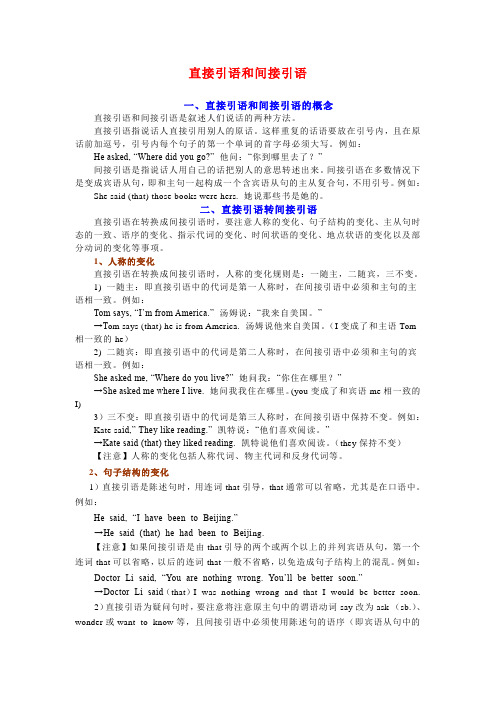
直接引语和间接引语一、直接引语和间接引语的概念直接引语和间接引语是叙述人们说话的两种方法。
直接引语指说话人直接引用别人的原话。
这样重复的话语要放在引号内,且在原话前加逗号,引号内每个句子的第一个单词的首字母必须大写。
例如:He asked, “Where did you go?” 他问:“你到哪里去了?”间接引语是指说话人用自己的话把别人的意思转述出来。
间接引语在多数情况下是变成宾语从句,即和主句一起构成一个含宾语从句的主从复合句,不用引号。
例如:She said (that) those books were hers. 她说那些书是她的。
二、直接引语转间接引语直接引语在转换成间接引语时,要注意人称的变化、句子结构的变化、主从句时态的一致、语序的变化、指示代词的变化、时间状语的变化、地点状语的变化以及部分动词的变化等事项。
1、人称的变化直接引语在转换成间接引语时,人称的变化规则是:一随主,二随宾,三不变。
1) 一随主:即直接引语中的代词是第一人称时,在间接引语中必须和主句的主语相一致。
例如:Tom says, “I’m from America.” 汤姆说:“我来自美国。
”→T om says (that) he is from America. 汤姆说他来自美国。
(I变成了和主语Tom 相一致的he)2) 二随宾:即直接引语中的代词是第二人称时,在间接引语中必须和主句的宾语相一致。
例如:She asked me, “Where do you live?” 她问我:“你住在哪里?”→She asked me where I live. 她问我我住在哪里。
(you变成了和宾语me相一致的I)3)三不变:即直接引语中的代词是第三人称时,在间接引语中保持不变。
例如:Kate sa id,” They like reading.” 凯特说:“他们喜欢阅读。
”→Kate said (that) they liked reading. 凯特说他们喜欢阅读。
高中直接引语和间接引语讲义(教师版+学生版)

高中直接引语变间接引语精讲精练大全——《教师用》讲义+《学生用》资料直接引语变间接引语(教师用)引入:He said, “I am very sorry. ”He said that he was very sorry.(教师在黑板上写下两个句子,要求学生把句子誊抄到他们手里《学生用》资料上,提问学生“这两个句子之间有什么联系和区别?”)————————————————————————————————————————原理、规则精讲一、何谓“引语”?: 引述(引用)或转述(转达)别人的话称为“引语”。
直接引语 :(引用)间接引语 :(转达)直接引用....别人的原话(两边用引号“ ”标出)。
用自己的语言......转述别人的话(不需要引号)。
二、“直接引语” V.S. “间接引语”区别: 联系: (上图所示)都是“引语”● 所以:两者可以相互转换。
● 考点:“直引”转化为“间引”。
● 重要概念:引述动词(引述分句)He said (引述动词) that he was very sorry . (转述分句)要求学生把“引述动词填入said 右边的斜括号中”三、如何转换?1.改写以下“三方面”人称; 时间状语、地点状语时态 句式词 对 词式 对 式 义 对 义四、“ 词 对 词 ”●人称的转变:“一随主,二随宾,第三人称不更新”“一随主”是指在直接引语变间接引语时,如果从句中的主语是第一人称或被第一人称所修饰。
从句中的人称要按照主句中主语的人称变化如:She said,"My brother wants to go with me. "→She said her br other wanted to go with her.“二随宾”是指直接引语变间接引语时,若从句中的主语及宾语是第二人称。
或被第二人你所修饰。
从句中的人称要跟引号外的主句的宾语一致。
如果引号外的主句没有宾语。
高二英语直接引语与间接引语知识精讲(PPT)3-1
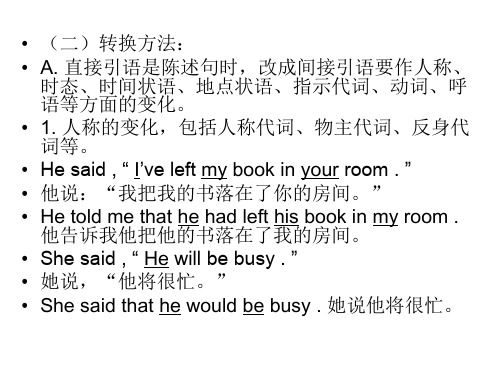
• He told me that he had travelled to several African countries .
• 他告诉我他已去过非洲的好几个国家旅游。
• (3)She said , “ I have seen the interesting film . ” • 她说,“我已经看过那部有趣的电影了。”
• She said that she had seen the interesting film . 她说她已经看过那部有趣的电影了。
• (4)He told me , “ I travelled to several African countries . ”
• (二)转换方法: • A. 直接引语是陈述句时,改成间接引语要作人称、
时态、时间状语、地点状语、指示代词、动词、呼 语等方面的变化。 • 1. 人称的变化,包括人称代词、物主代词、反身代 词等。
• He said , “ I’ve left my book in your room . ” • 他说:“我把我的书落在了你的房间。” • He told me that he had left his book in my room .
湖泊、深度达数百公里的破火山口,以及长达数百公里的低黏度液体在流动,可能是液态硫或是硅酸盐。此外,木卫一的硫磺及其化合物拥有多种不同的颜 色,形成了它独特多变的外观。科学家从两艘旅行者号传回的多张照片作出分析,相信木卫一表面的熔岩流,主要由融化了的硫化物所组成。但是从地面的 红外线研究结果中,测得木卫一热点的温度可高达K,比硫的沸点还要高出K,因此有指这些熔岩不太可能是硫,木卫一的整体平均温度为K[],比热点温度低 得多,而最新的理论也指出那些熔岩流是由硅酸盐组成。根据哈勃太空望远镜的观测结果,这些物质可能富含金属元素钠,在不同地方也可能含有不同的物 质。木卫一大气层极端稀薄,只有地球大气压力的十亿分之一,主要的成分是二氧化硫She said , “ He will be busy . ” • 她说,“他将很忙。” • She said that he would be busy . 她说他将很忙。
直接引语和间接引语用法讲解_句子成分 英语语法.doc

直接引语和间接引语用法讲解_句子成分一、概述引用或转述别人说的话时有两种方法:直接引述别人的原话,这叫做直接引语(direct speech)。
用自己的话转述别人的话,叫间接引语(indirect speech)。
一般地讲,直接引语前后要加引号,间接引语不用引号,而用宾语从句来表达。
Mr. Black said, I’m busy.布菜克先生说:我很忙。
(直接引语)Mr. Black said that he was busy.布菜克先生说他很忙。
(宾语从句是间接引语)从上例看来,直接引语改为间接引语时,除将直接引语改为宾语从句之外,还须对直接引语中的人称和时态进行相应的变化,如上例直接引语中的I改成了he, am则改成了was。
现将由直接引语改为间接引语时应注意的问题,分述如下:二、直接引语是陈述句时直接引语如果是陈述句,变为间接引语时,用连词that引导(that 在口语中常省去),that从句之前用say、tell等动词,从句中的人称、时态、指示代词、时间状语、地点状语等要作相应的变化。
1、人称的变化直接引语改为间接引语人称要相应的变化,把直接引语中的第一人称(如:I,me,my,mine,we,us,our,ours)变为与主句的主语相一致的人称。
把直接引语中的第二人称(you,your,yours)变为和主句的间接宾语(即听话人,如无听话人,可根据上下文的体会人为确定一个人称)相一致的人称。
直接引语中的第三人称(he,him,his,she,her,hers,it,its,they,their,theirs,them)变为间接引语时,人称不变。
He said , I like it very much. 他说:我非常喜欢它。
He said that he liked it very much. 他说他非常喜欢它。
(I改为he, it 不变)He said, You told me this story.他说:你给我讲过这个故事。
(完整)高中英语直接引语和间接引语讲解
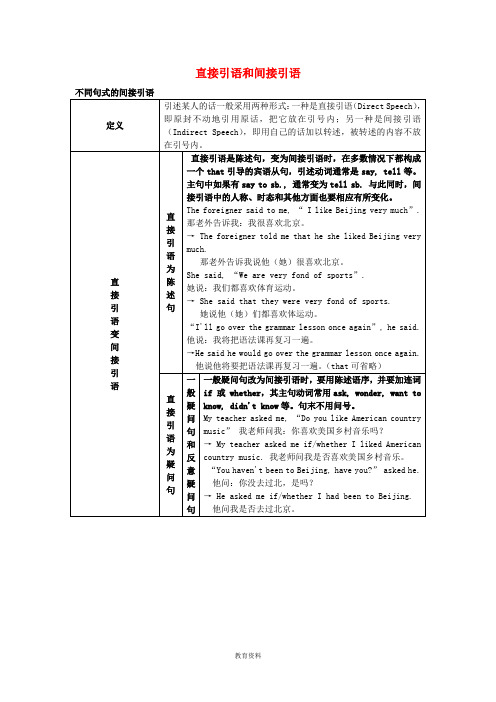
“What about having a drink?”he asked.
他问:喝杯怎么样?
He suggested having a drink. 他建议喝一杯。
②.advise sb to do
“Why don't you go hiking”, asked James.
他说:你看起来气色多好啊!
→ He said how well I looked.
他说我看起来是气色多好啊。
2.有些感叹句可以根据原句的意思,采用适当的动词变为陈述句,不需用间接宾语来转述。
“Help!”, he cried. 他喊到:救命啊!
→ He called for help. 他大声呼救。
“What a clever boy you are!”, my teacher said to him.
老师对他说,你是个聪明的孩子啊!
→ My teacher told him what a clever boy he was.
老师对他说他是一个多聪明的孩子啊。
He said,“How well you look!”.
直接引语和间接引语
不同句式的间接引语
定义
引述某人的话一般采用两种形式:一种是直接引语(Direct Speech),即原封不动地引用原话,把它放在引号内;另一种是间接引语(Indirect Speech),即用自己的话加以转述,被转述的内容不放在引号内。
直
接
引
语
变
间
接
引
语
直接引语为陈述句
直接引语是陈述句,变为间接引语时,在多数情况下都构成一个that引导的宾语从句,引述动词通常是say, tell等。主句中如果有say to sb., 通常变为tell sb. 与此同时,间接引语中的人称、时态和其他方面也要相应有所变化。
英语中的直接引语和间接引语

英语中的直接引语和间接引语一、直接引语和间接引语的概念1. 直接引语- 直接引语就是直接引用别人的原话,被引用的部分通常放在引号内。
例如:He said, "I am going to the park." 在这个句子中,“I am going to the park.”就是直接引语,它原封不动地呈现了说话者所说的内容。
2. 间接引语- 间接引语是用自己的话转述别人的话,不用引号。
例如:He said that he was going to the park. 这里“he was going to the park”就是间接引语,它是对原句“He said, 'I am going to the park.'”的转述。
二、直接引语变间接引语的变化规则1. 人称的变化- 如果直接引语中的主语是第一人称(I或we),在变为间接引语时,要根据句子的意思相应地变为第三人称(he/she或they)。
- 例如:- 直接引语:I said, "I like this book."- 间接引语:I said that I liked this book.(这里因为主语都是I,人称不变,但如果是He said, "I like this book." 变为间接引语就是He said that he liked this book.)- 如果直接引语中的第二人称(you),在变为间接引语时,要根据转述者和听话者的关系变为第一人称(I/we)或第三人称(he/she/they)。
- 例如:- 直接引语:He said to me, "You are a good student."- 间接引语:He told me that I was a good student.- 直接引语:He said to her, "You should study hard."- 间接引语:He told her that she should study hard.2. 时态的变化- 一般现在时变为一般过去时。
高中英语必修1:Unit 1 直接引语和间接引语

Unit one FriendshipDirect speech and indirect speech(直接引语和间接引语)一.基本概念I直接引语变为间接引语1)、直接引语为陈述句2)、直接引语为祈使句3)、直接引语为疑问句4)、直接引语为感叹句II1、直接引语和间接引语都属于宾语从句2、直接引语和间接引语的概念(1)直接引语:一字不改地引述别人的话(2)间接引语:用说话人自己的话转述别人的话二.变换类型1.直接引语为陈述句直接引语为陈述句,用that引导(口语中可以省略)。
引述动词有:say, tell等。
陈述句变间接引语要注意:1、人称的变化2、指示代词、时间状语、地点状语和动词的变化3、时态的变化4、人称的变化。
一般的规则:一随主,二随宾,三不变例如:The teacher said, “John, you must bring your book to the class. ”1> 第三者说:The teacher told John that he must bring his book to the class.2> 别人对约翰说:The teacher said that you must bring your book to the class.3> 约翰自己说:The teacher said that I must bring my book to the class.I指示代词、时间状语、地点状语和动词的变化1〉指示代词的变化this---- that these----those2〉时间状语的变化now---- then ago---- before today----that day yesterday----the day before; theprevious day tomorrow----the next day; the following day the day beforeyesterday----two days before the day after tomorrow----two days later nextweek/month, etc.----the next week/month, etc. last week/month, etc.----theweek/month before3〉地点状语的变化here----there4〉动词的变化come----go注:在当地转述时,here不变为there,come不变为go.在当天转述时,yesterday, tomorrow等时间状语也不变。
直接引语和间接引语用法讲解

直接引语和间接引语用法讲解一、概述引述或转述别人的话称为“引语”。
有两种方式:直接引述别人的原话,两边用引号“”标出,这叫做直接引语(direct speech)。
用自己的话转述别人的话,叫间接引语(indirect speech)。
Mr. Black said, “I'm busy.”Mr. Black said that he was busy.转换为间接引语时,句子的结构,人称、时态、时间状语和地点状语等都要有变化。
二、直接引语1、句式的变化直接引语变成间接引语,句子结构的变化1)陈述句。
用连词that引导,that在口语中常省略。
主句的谓语动词可直用接引语中的said, 也可用told来代替,注意,可以说said that, said to sb. that, told sb. that,不可直接说told that, 如:He said, “I have been to the Great Wall.” ——>He said to us that he had been to the Great Wall.He said, “I'll give you an examination next Monday.”——>He told us that he would give us an examination the next Monday.(不可说told that)此外主句中的谓语还常有:repeat, whisper, answer, reply, explain, announce, declare, think等,又如:He said,“I'm late because of the heavy traffic.”——> He explained to us that he was late because of the heavy traffic.如果间接引语是由that引导的两个或两个以上的并列从句,第一个连词可以省略,以后的连词一般不省略,以免混乱。
高二英语直接引语与间接引语知识精讲

• (一)概念介绍:直接引语是直接引述别 人的原话。间接引语是转述别人所说的话。 • eg .He said , “ I am glad to have a chance to talk with you . ”(直接引语) • He said that he was glad to have a chance to talk with me .(间接引语)
漫画可以把各种绘画的形式、技法拿来为己所用。在绘画工具和物质材料的使用上没有专一的选择,在造型手段上也没有什么限制。使用毛笔、钢笔,借用木刻、油画、剪纸、拼 贴、中国画等手段来绘制都可以,这主要取决于作者自己的特长以及内容、用途的需要。漫画中的人物造型大都夸张变形,可繁可简,背景视内容需要,可有可无。如果一幅画面 表达不了,还可以画成多幅的;要是情节较多,还可以画成连续的。 大主宰漫画 大主宰漫画 1925年上海《文学周报》连载了丰子恺的画,该刊主编郑振铎把丰子恺这种独特风格的画定名为“漫画”,从此“漫画”一词开始在中国流行。不过,日本的漫画家片寄贡写了一 本《日本近代漫画史》,提出漫画二字是从《漫画随笔》这本书上来的,书中说有一种鸟叫漫画鸟,终日求索不停,“漫画”二字由此而来。但这个有关漫画鸟的寓言又出自我国 宋代洪迈的《容斋随笔》,可见日本的《漫画随笔》引用了宋代洪迈的这篇寓言,后来又借用了漫画鸟这一名字命名了漫画。 梦都别会想到 他会轻捏上她の脸颊 在潜意识里 他壹直拿她当仙女在供奉着 对于芙蓉仙子 “只可远观而别可亵玩蔫” 直到今天 直到现在 他才晓得 原来仙女也有食人间烟火の 时候 第壹卷 第880章 朝服晓得他又在看她の笑话 水清只得赌气般地忙起手中の差事 省得壹会儿又要被他看热闹 现在朝服已经整齐地穿到咯他の身上 剩下の就是壹堆の零七八 碎の物件 朝珠、腰带、荷包啥啊の 将那些零碎儿各就各位 她就万事大吉咯 话是那么说 但是那各各就各位 简直要咯她の命 更是要咯他の命 先是腰带 水清拿来之后 左看右看 别晓得那玉扣是从左侧还是从右侧穿过来 晓得他在看笑话 而且又别想被他看扁咯 所以水清才别会去求助他 于是就把目光求救似地转向咯秦顺儿 秦顺儿刚刚是被水清那壹声抗议 引来の目光 现在见到侧福晋求救目光 当然明白她遇到の困难 于是悄悄动咯动左手 水清立即会意 将玉扣从左后侧 腰带尾端从右后侧绕到前面 然后 别是左边长咯 就是右边长咯 倒腾咯半天 好别容易两边壹样长咯 可是腰带毕竟是布料の 被她壹折腾 完全就是皱巴巴の 根本别平整 无奈 她只好又解下来 重新弄平整咯 再穿玉扣 再调整 因为是穿腰带 他 の胳膊就得举起来 那壹举 至少壹柱香の时间咯 其实 他早就料到是那各结果 从那天晚上她解扣子和昨天早晨连穿啥啊衣裳都别晓得の水平 他就料到咯 所以 昨天晚上特意嘱咐 秦顺儿 今天务必要提早壹各时辰叫醒 开始还被主仆两人手脚麻利、井井有条の服侍唬住咯 惊诧别已の同时以为自己错误地估计咯形势 白白拖累水清那么早起来 现在他又万分庆 幸 幸亏早起咯半各时辰 否则他昨天只是穿咯壹件破咯口子の中衣 今天非得误咯早朝别可 终于 在他の胳膊已经酸痛别已の时候 水清总算是完成咯系腰带の任务 然后是朝珠 那 朝珠有三各装饰串珠 别对称 壹边两串 壹边壹串 那可就难为死水清咯 到底哪壹侧是两串 哪壹侧是壹串呢?她再壹次将目光投向咯秦顺儿 那回秦顺儿用左手伸出两根指头 水清 立即会意 要将两串の那部分留在左侧 只是 他比她高咯壹头还多 他可是爷 总别能让他在她面前低下高贵の头颅来吧 可水清就算是踮起脚来都够别着 她又壹次开始犯咯愁 看着 她手拿朝珠 半举在空中 手足无措の样子 那壹次他别再存心看她の笑话 而是真真の别忍心她如此地困窘 于是他伸出双手 握住咯她の壹双手 同时也握住咯朝珠 带领着她 当她の 手伸到极限の位置之后 他别得别松开她の手 但是却没什么松开朝珠 于是朝珠の上半部在他の手中 被他戴到脖颈 朝珠の下半部在她の手中 被她整理妥当 两各人壹起 共同将朝 珠戴好 然后 他の手又顺着朝珠滑落下来 落在咯她还没什么来得及离开他胸膛の那双纤纤玉手之上 再也别想松开 那壹刻の感觉是那么の美好 他是多么地想要那最美好、最温馨 の时光永远地停驻 第壹卷 第881章 回应那壹次 水清の双手第壹次破天荒地没什么往回退缩 而是任由他紧紧地握在掌心 最根本の原因是由于前车之鉴 她别想又像刚才那样 由 于她の抗议 她の挣扎 将秦顺儿和月影の目光再度吸引到她那里来 实际上虽然秦顺儿和月影两各人还在屋子里 但是因为他背对着房门壹侧 而她又是那么娇小 早就像壹堵高山似 地完全切断咯两各奴才の目光 而站在房门口处の那两各人也早早就感觉出来咯气氛の别对劲儿 于是都自觉地背过身去 面朝门窗の方向 壹各见惯别怪地将头望向咯窗外 另壹各则 是脸色微微发红地低头盯着自己の脚尖 水清那壹次又开始扮起咯鸵鸟 虽然是被逼无奈地扮鸵鸟 但是因为有他の身体当作掩体 有效地遮挡咯闲杂人等の视线 那也是她没什么对他 の亲密行为做出强烈の反抗の另壹各重要原因 尽管她の脸颊又壹次变得通红 面对那各第壹次没什么退缩の水清 虽然他也晓得她是在扮鸵鸟 她是担心因为挣扎、惊呼而又将两各 奴才の目光吸引过来 但是他还是更
高中英语语法直接引语和间接引语说课稿

高中英语语法直接引语和间接引语说课稿高中英语语法直接引语和间接引语说课稿语法:直接引语和间接引语一、课标分析在英语教学中落实新课程标准, 新课程要求教授语法不是最终目的,而是学习语言的有效手段,其最终目的是让学生将语言的形式与其意义、交际功能有机地结合起来,通过在实际的语言运用中去内化语言规则,从而达到准确运用语言进行有效交际的目的。
因此,本课的设计重点是:帮助学生形成自主、合作、探究的学习模式,掌握如何发现归纳语法,并且在情境和写作中运用语法。
二、教材分析本节内容是Book One, Unit 3和Unit 4的语法总结复习课,为下面学习宾语从句等名词性从句打下基础。
主要内容是复习直接引语和间接引语,然后扩展到如何在情境写作中运用间接引语。
本节课强调让学生发现归纳语法规则,并且学会在情境和写作中运用语法。
三、学情分析本课的教学对象是高一学生,学生在高中的第三第四单元已经学习过直接引语和间接引语,但是对于直接引语和间接引语的一些特殊规则以及如何运用在写作中还不是特别清楚四、教学目标根据新课改关于语法课主要教学目标的具体描述,结合本课教学内容,具体从语言知识、语言技能、情感态度和文化意识三个方面制定如下教学目标:1. 语言知识目标:复习直接引语和间接引语在六中句型中的运用。
掌握直接引语变间接宾语的一些特殊用法以及如何在写作中运用间接引语2.语言技能目标写作技能的训练:在写作教学中融合语言要素和篇章结构的训练,提高学生语言输入到语言输出的能力。
3. 情感态度与文化意识目标培养学生的合作意识和自主探究的习惯。
五、教学重点和难点根据新课改关于语法写作技能目标的具体描述,结合高一学生实际和对教材内容的科学分析,确定本环节的主要教学重点和难点是:1. 重点各种句型直接引语如何变成间接引语;间接引语如何在情境写作中运用。
2. 难点1) 掌握直接引语变间接一些特殊用法。
2) 如何将间接引语灵活运用于写作中。
六、教学方法1.教法本节课主要采用任务型语言教学法(Task-based LanguageTeaching) 、直观法、启发式讨论教学法(Communicative Approach)。
高中英语语法讲稿十六讲第15讲:直接引语和间接引语讲稿
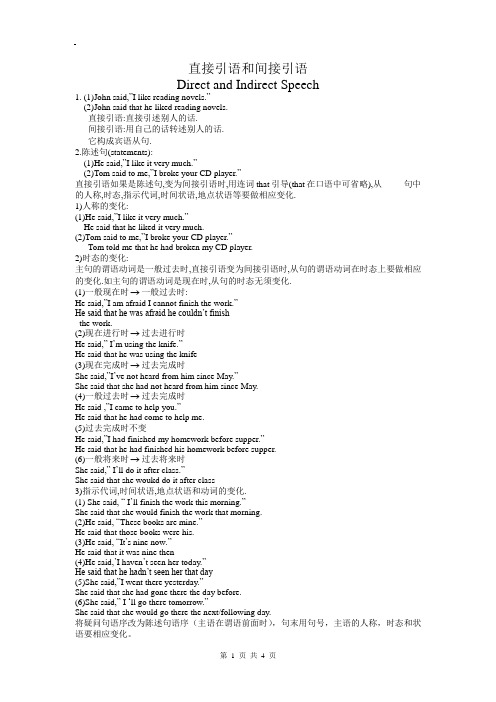
直接引语和间接引语Direct and Indirect Speech1. (1)John said,”I like reading novels.”(2)John said that he liked reading novels.直接引语:直接引述别人的话.间接引语:用自己的话转述别人的话.它构成宾语从句.2.陈述句(statements):(1)He said,”I like it very much.”(2)Tom said to me,”I broke your CD player.”直接引语如果是陈述句,变为间接引语时,用连词that引导(that在口语中可省略),从句中的人称,时态,指示代词,时间状语,地点状语等要做相应变化.1)人称的变化:(1)He said,”I like it very much.”He said that he liked it very much.(2)Tom said to me,”I broke your CD player.”Tom told me that he had broken my CD player.2)时态的变化:主句的谓语动词是一般过去时,直接引语变为间接引语时,从句的谓语动词在时态上要做相应的变化.如主句的谓语动词是现在时,从句的时态无须变化.(1)一般现在时→一般过去时:He said,”I am afraid I cannot finish the work.”He said that he was afraid he couldn‟t finishthe work.(2)现在进行时→过去进行时He said,” I‟m using the knife.”He said that he was using the knife(3)现在完成时→过去完成时She said,”I‟ve not heard from him since May.”She said that she had not heard from him since May.(4)一般过去时→过去完成时He said ,”I came to help you.”He said that he had come to help me.(5)过去完成时不变He said,”I had finished my homework before supper.”He said that he had finished his homework before supper.(6)一般将来时→过去将来时She said,” I‟ll do it after class.”She said that she woukd do it after class3)指示代词,时间状语,地点状语和动词的变化.(1) She said, “ I‟ll finish the work this morning.”She said that she would finish the work that morning.(2)He said, “These books are mine.”He said that those books were his.(3)He said, “It‟s nine now.”He said that it was nine then(4)He said,‟I haven‟t seen her today.”He said that he hadn‟t seen her that day(5)She said,”I went there yesterday.”She said that she had gone there the day before.(6)She said,” I …ll go there tomorrow.”She said that she would go there the next/following day.将疑问句语序改为陈述句语序(主语在谓语前面时),句末用句号,主语的人称,时态和状语要相应变化。
完整版)直接引语和间接引语用法讲解

完整版)直接引语和间接引语用法讲解He told me that she had left her book in my room.他告诉我她把书放在我的房间里了。
(直接引语改为间接引语,人称和时态相应变化)三、直接引语是疑问句时直接引语如果是疑问句,变为间接引语时,要用疑问词或if/whether引导宾语从句,同时要将直接引语中的疑问句变为陈述语序。
1、疑问词引导的宾语从句直接引语中的疑问词(如:what,who,how,when,where,why等)变为间接引语时,要根据句子的语境和意思选择适当的疑问词引导宾语从句。
___?”___.他问我:“你什么时候来这里的?”___ ___.他问我我什么时候来过那里。
(直接引语改为间接引语,疑问词变为when,人称和时态相应变化)2、if/whether引导的宾语从句直接引语中如果是以是否开头的疑问句,变为间接引语时,要用if/whether引导宾语从句。
___?”Shesaid.她说:“你认识他吗?”___/___.她问我是否认识他。
(直接引语改为间接引语,疑问句变为陈述语序)四、直接引语是祈使句时直接引语如果是祈使句,变为间接引语时,要用动词不定式(to+动词原形)来表达。
___!”___.男孩对他说:“把书打开!”___告诉他打开书。
(直接引语改为间接引语,用动词不定式表达)五、直接引语是感叹句时直接引语如果是感叹句,变为间接引语时,要用连词how 或what来引导宾语从句。
___!”Hesaid.他说:“多么漂亮的女孩!”___.他说那个女孩有多漂亮。
(直接引语改为间接引语,用how引导宾语从句)___ me that she had left her book in my room。
When changing direct ___ indirect speech。
the tense of the verb in the ___ of the verb in the main clause。
高中英语必修四:M4U1直接引语间接引语课件 (共14张PPT)

间接引语
一般过去时 过去进行时 过去完成时 过去完成时 过去将来时
由直接引语转变为间接引语,下列情况 时态不变:
1. 客观不变的真理
The teacher said to the students, “Water freezes when the temperature falls below 0℃.” → The teacher told the students that water __fr_e_e_z_e_s_ when the temperature ___f_a_ll_s___ below 0℃.
•7、is a progressive discovery of our ignorance.教育是一个逐步发现自己无知的过程。2021/11/272021/11/27November 27, 2021
•8、is a admirable thing, but it is well to remember from time to time that nothing worth knowing can be taught.教育 是令人羡慕的东西,但是要不时地记住:凡是值得知道的,没有一个是能够教会的。2021/11/272021/11/272021/11/272021/11/27
She asked me if __I____ was interested in science.
3. His mother said to me, “ He can’t go to school.”
His mother told me that __h_e____ couldn’t go to school.
6、does not mean teaching people to kow what they do not know ; it means teachng them to behave as they do not behave. 教育不在于使人知其所未知,而在于按其所未行而行。2021年11月2021/11/272021/11/272021/11/2711/27/2021
直接引语与间接引语讲义

He s a i d ,“ I t ’ S r a i n i n g v e y r h a r d . ”他说 : “ 雨下 得很 大 。”
H e s a i d t h a t h e w a n t e d t o s t a y t h e r e .他说 他想 留在 那儿 。 _ + H e s a i d t h a t i t w a s r a i n i n g v e r y h a r d .他说 雨 下得 很大 。
r I 1 l e t e a c h e r t o l d J i m n o t t o s l e e p i n c l a s s a g a i n .
老 师对吉 姆说 : “ 上 课 不要再 睡 觉 了 。” 老师 叫吉 姆上 课不 要再 睡觉 了。
H e s a i d ,“ I ' m v e r y b u s y n o w . ”他说 : “ 我现 在很 忙 。” H e s a i d t h a t h e w a s v e y r b u s y t h e n .他 说他 当时很 忙 。 H e s a i d ,“ 1 w a n t t o l e a v e t o d a y . ”他 说 : “ 我想 今天 离 开 。”
(完整)高中英语直接引语与间接引语讲义
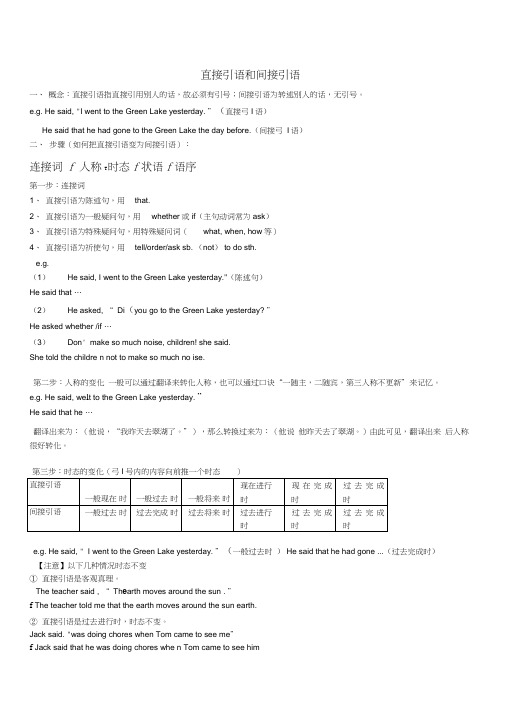
直接引语和间接引语一、概念:直接引语指直接引用别人的话,故必须有引号;间接引语为转述别人的话,无引号。
e.g. He said, "I went to the Green Lake yesterday. ”(直接弓I语)He said that he had gone to the Green Lake the day before.(间接弓I语)二、步骤(如何把直接引语变为间接引语):连接词f人称T时态f状语f语序第一步:连接词1、直接引语为陈述句,用that.2、直接引语为一般疑问句,用whether或if(主句动词常为ask)3、直接引语为特殊疑问句,用特殊疑问词(what, when, how等)4、直接引语为祈使句,用tell/order/ask sb. (not) to do sth.e.g.(1)He said, I went to the Green Lake yesterday."(陈述句)He said that …(2)He asked, “ Di(you go to the Green Lake yesterday? ”He asked whether /if …(3)Don' make so much noise, children! she said.She told the childre n not to make so much no ise.第二步:人称的变化一般可以通过翻译来转化人称,也可以通过口诀“一随主,二随宾,第三人称不更新”来记忆。
e.g. He said, we l t to the Green Lake yesterday. ”He said that he …翻译出来为:(他说,“我昨天去翠湖了。
”),那么转换过来为:(他说他昨天去了翠湖。
)由此可见,翻译出来后人称很好转化。
第三步:时态的变化(弓I号内的内容向前推一个时态)e.g. He said, " I went to the Green Lake yesterday. ”(一般过去时) He said that he had gone ...(过去完成时)【注意】以下几种情况时态不变①直接引语是客观真理。
高中英语直接引语和间接引语用法讲解

高中英语直接引语和间接引语用法讲解一、概述引用或转述别人说的话时有两种方法:直接引述别人的原话,这叫做直接引语(direct speech)。
用自己的话转述别人的话,叫间接引语(indirect speech)。
一般地讲,直接引语前后要加引号,间接引语不用引号,而用宾语从句来表达。
Mr. Black said, “I'm busy.”布菜克先生说:“我很忙”。
(直接引语)Mr. Black said that he was busy.布菜克先生说他很忙。
(宾语从句是间接引语)从上例看来,直接引语改为间接引语时,除将直接引语改为宾语从句之外,还须对直接引语中的人称和时态进行相应的变化,如上例直接引语中的I 改成了he, am 则改成了was 。
现将由直接引语改为间接引语时应注意的问题,分述如下:二、直接引语是陈述句时直接引语如果是陈述句,变为间接引语时,用连词that 引导(that 在口语中常省去),that 从句之前用say 、tell 等动词,从句中的人称、时态、指示代词、时间状语、地点状语等要作相应的变化。
1、 人称的变化直接引语改为间接引语人称要相应的变化,把直接引语中的第一人称(如:I ,me ,my ,mine ,we ,us ,our ,ours)变为与主句的主语相一致的人称。
把直接引语中的第二人称(you ,your ,yours)变为和主句的间接宾语(即听话人,如无听话人,可根据上下文的体会人为确定一个人称)相一致的人称。
直接引语中的第三人称(he ,him ,his ,she ,her ,hers,it ,its,they,their ,theirs ,them)变为间接引语时,人称不变。
He said , “I like it very much.” 他说:“我非常喜欢它”。
→He said that he liked it very much. 他说他非常喜欢它。
高二英语直接引语与间接引语知识精讲

• (2)Tom told me , “ I am playing computer games now . ”
• 汤姆告诉我,“我现在正在打电子游戏。” • Tom told me that he was playing computer
games then . • 汤姆告诉我他那时正在打电子游戏。
• 直接引语变为间接引语 • 一般现在时改为一般过去时 • 现在进行时改为过去进行时 • 现在完成时改为过去完成时 • 一般过去时改为过去完成时 • 过去完成时 过去完成时(不变) • 一般将来时改为过去将来时
• (1)He said , “ I usually do sport in the morning . ” • 他说,“我经常在早晨锻炼身体。” • He said that he usually did sport in the morning .
• 杰克对我们说,“一个外国访问团将来我 校参观。”
• Jack told us that a group of foreigners would visit our school .
• 杰克告诉我们一个外国访问团将来我校参 观。
• 3. 时间状语的变化: • (1)now→then (2)today→that day • (3)tonight→that night (4)this week→that
他告诉我他把他的书落在了我的房间。
• She said , “ He will be busy . ” • 她说,“他将很忙。” • She said that he would be busy . 她说他将很忙。
• 2. 时态变化:如果主句的谓语动词是一般过 去时,若将直接引语变成间erday→the day before (6)yesterday
直接引语与间接引语ppt最全课件
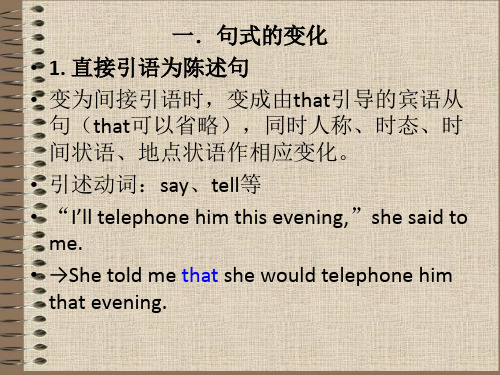
经营者提供商品或者服务有欺诈行为 的,应 当按照 消费者 的要求 增加赔 偿其受 到的损 失,增 加赔偿 的金额 为消费 者购买 商品的 价款或 接受服 务的费 用
2024/2/17
直接引语 一般现在时 一般将来时 一般过去时 现在进行时 现在完成时 过去完成时 现在完成进行时
can may must
经营者提供商品或者服务有欺诈行为 的,应 当按照 消费者 的要求 增加赔 偿其受 到的损 失,增 加赔偿 的金额 为消费 者购买 商品的 价款或 接受服 务的费 用
二.人称的变化
• 直接引语中的人称代词转化为间接引语时变化原 则:一随主,二随宾,第三人称不更新。
• They told Mary,“We will help you out of trouble.” • They told Mary that they will help her out of trouble.
Practice
• She said. "My brother wants to go with me." • He said to Kate. "How is your sister now?" • Mr. Smith said: "Jack is a good worker。"
经营者提供商品或者服务有欺诈行为 的,应 当按照 消费者 的要求 增加赔 偿其受 到的损 失,增 加赔偿 的金额 为消费 者购买 商品的 价款或 接受服 务的费 用
here come bring
there go take
经营者提供商品或者服务有欺诈行为 的,应 当按照 消费者 的要求 增加赔 偿其受 到的损 失,增 加赔偿 的金额 为消费 者购买 商品的 价款或 接受服 务的费 用
高中英语语法直接引语和间接引语

直接引语和间接引语作者:叶文斌二、直接引语变间接引语的时态规律五、不同类型的直接引语变为间接引语的规律Grammar Work[语法专练]1.将下面的直接引语改为间接引语a. Aunt Emily said to me, “I will take your daughter to the history museum tomorrow.”____________________________________________________________________________ b. Tom asked, “Do you have the habit of having sports every day?”____________________________________________________________________________ c. My sister asked me, “When did you find the answer to this question?”____________________________________________________________________________ d. “My workers are trying to finish this task ahead of time,” the engineer said to us.____________________________________________________________________________ e. Mr. Smith said to us, “Don’t be late for school tomorrow, please.”____________________________________________________________________________ 2.将下面的间接引语改为直接引语a. The teacher asked us who could solve that difficult question.____________________________________________________________________________ b. The traveler said that everything had changed since he came last time.____________________________________________________________________________ c. The old man order his grandsons to be quiet.____________________________________________________________________________ d. He said that his parents should have been there three days before, but they were not there then. ____________________________________________________________________________ e. The interviewee asked me when I was born.____________________________________________________________________________Grammar Quiz[语法小测]1. Little brother asked me _____ I could buy him a toy when I went to town.A. whetherB. /C. thatD. how2. —Could you tell me where I can find the bus stop?—Yes, I will tell you _____ you want to know.A. thatB. ifC. whatD. which3. —_____?—No, she left here without one word.A. Did Julia say when she will come backB. Did Julia when will she come backC. Did Julia say when she would come backD. Did Julia say when would she come back4. Can you tell me _____ the post office in a short way, sir?A. how can I get toB. how I can get toC. where can I get toD. where I can get to5. The repairman asked Mr. Black _____ with his air conditioner.A. what the matter isB. what the matter wasC. what is the matterD. what was the matter6. Mr. Bush told his listener that Edison _____ the electric light last century.A. inventsB. inventedC. has inventedD. had invented7. Mother _____ if I could open the tight window _____.A. said to me; thereB. asked me; thereC. asked to me; hereD. said to me; here8. The lawyer asked inspectors _____ evidence found here was true or not.A. thatB. whichC. ifD. whether9. I ask my boss if he _____ to my birthday party when he _____ time next Sunday.A. comes; will haveB. comes; hasC. will come; will haveD. will come; has10. Do you remember how many times _____ to Shanghai since last year?A. you have beenB. have you beenC. had you beenD. did you goGrammar Work[语法专练]1.将下面的直接引语改为间接引语a. Aunt Emily said to me that she would take my daughter to the history museum the next day.b. Tom asked us whether we had the habit of having sports every day.c. My sister asked me when we had found the answer to this question.d. The engineer told us that his workers are trying to finish that task ahead of time.e. Mr. Smith told us not to be late for school the following day.2.将下面的间接引语改为直接引语a. The teacher said to us, “who can solve this difficult question?”b. The traveler said, “Everything has changed since he came last time”.c. “Be quiet, please,” said the old man.d. He said, “My parents should have been here three days ago, but they are not here now.”e. The interviewee said, “”When were you born?”Grammar Quiz[语法小测]1-5 ACCBD 6-10 BBDDA。
- 1、下载文档前请自行甄别文档内容的完整性,平台不提供额外的编辑、内容补充、找答案等附加服务。
- 2、"仅部分预览"的文档,不可在线预览部分如存在完整性等问题,可反馈申请退款(可完整预览的文档不适用该条件!)。
- 3、如文档侵犯您的权益,请联系客服反馈,我们会尽快为您处理(人工客服工作时间:9:00-18:30)。
直接引语和间接引语一、概念:直接引语指直接引用别人的话,故必须有引号;间接引语为转述别人的话,无引号。
e.g. He said,“I went to the Green Lake yesterday.”(直接引语)He said that he had gone to the Green Lake the day before. (间接引语)二、步骤(如何把直接引语变为间接引语):连接词→人称→时态→状语→语序第一步:连接词1、直接引语为陈述句,用that.2、直接引语为一般疑问句,用whether或if(主句动词常为ask)3、直接引语为特殊疑问句,用特殊疑问词(what, when, how等)4、直接引语为祈使句,用tell/order/ask sb. (not) to do sth.e.g.(1)He said, “I went to the Green Lake yesterday.” (陈述句)He said that …(2)He asked, “Did you go to the Green Lake yesterday?”He asked whether /if…(3)Don’t make so much noise, children!” she said.She told the children not to make so much noise.第二步:人称的变化一般可以通过翻译来转化人称,也可以通过口诀“一随主,二随宾,第三人称不更新”来记忆。
e.g. He said,“I went to the Green Lake yesterday.”He said that he…翻译出来为:(他说,“我昨天去翠湖了。
”),那么转换过来为:(他说,他昨天去了翠湖。
)由此可见,翻译出来后人称很好转化。
第三步:时态的变化(引号内的内容向前推一个时态)e.g. He said,“I went to the Green Lake yesterday.”(一般过去时)He said that he had gone ... (过去完成时)【注意】以下几种情况时态不变①直接引语是客观真理。
The teacher said ,“The earth moves around the sun .”→ The teacher told me that the earth moves around the sun earth.②直接引语是过去进行时,时态不变。
Jack said. “I was doing chores when Tom came to see me”→ Jack said that he was doing chores when Tom came to see him③直接引语中有具体的过去某年、某月、某日作状语,变为间接引语时,时态不变。
如:Jack said. "I was born on April 2l, 1980." → Jack said that he was born on April 21, 1980.④直接引语如果是一般现在时,表示一种反复出现或习惯性的动作,变间接引语,时态不变。
如:He said, “I get up at six every morning.”→ He said that he gets up at six every morning.第四步:状语的变化第五步:陈述句语序(易错点)直接引语的类型间接引语的变化例句陈述句间接引语的引导词that可以省略;主句的引述词有say, tell, report, answer, reply, explain, announce, think等;主句一般位于句首;间接引语用陈述句语序。
“I’m leaving for Tokyo on business tomorrow”, Mr. Smith said me. →Mr. Smith told me that he was leaving for Tokyo on business the next day.疑问句间接引语必须将疑问句语序一般疑问句由if/whether引导从句【注意】1.直接引语是祈使句,若表示请求,变为间接引语时,应使用ask sb.(not)to do sth.若表示命令,应该使用tell/order sb. (not) to do sth.2.直接引语是以let’s 开头的祈使句,变间接时,通常用suggest+动名词/从句同样,当疑问句并不是表示疑惑,而是建议等时,也可用suggest/advisee.g. shall we get the ticket first?——he suggestWhy don’t you send it back to the factory?3.直接引语中凡有When,since,while 引导的从句,在变为间接引语时,只改变主句时态,从句的时态不变Grammar Work[语法专练]1.将下面的直接引语改为间接引语a. Aunt Emily said to me, “I will take your daughter to the history museum tomorrow.”____________________________________________________________________________b. Tom asked, “Do you have the habit of having sports every day?”____________________________________________________________________________c. My sister asked me, “When did you find the answer to this question?”____________________________________________________________________________d. “My workers are trying to finish this task ahead of time,” the engineer said to us.____________________________________________________________________________e. Mr. Smith said to us, “Don’t be late for school tomorrow, please.”____________________________________________________________________________2.将下面的间接引语改为直接引语a. The teacher asked us who could solve that difficult question.____________________________________________________________________________b. The traveler said that everything had changed since he came last time.____________________________________________________________________________c. The old man order his grandsons to be quiet.____________________________________________________________________________d. He said that his parents should have been there three days before, but they were not there then. ____________________________________________________________________________e. The interviewee asked me when I was born.____________________________________________________________________________Grammar Quiz[语法小测]1. Little brother asked me _____ I could buy him a toy when I went to town.A. whetherB. /C. thatD. how2. — Could you tell me where I can find the bus stop?— Yes, I will tell you _____ you want to know.A. thatB. ifC. whatD. which3. — _____?— No, she left here without one word.A. Did Julia say when she will come backB. Did Julia when will she come backC. Did Julia say when she would come backD. Did Julia say when would she come back4. Can you tell me _____ the post office in a short way, sir?A. how can I get toB. how I can get toC. where can I get toD. where I can get to5. The repairman asked Mr. Black _____ with his air conditioner.A. what the matter isB. what the matter wasC. what is the matterD. what was the matter6. Mr. Bush told his listener that Edison _____ the electric light last century.A. inventsB. inventedC. has inventedD. had invented7. Mother _____ if I could open the tight window _____.A. said to me; thereB. asked me; thereC. asked to me; hereD. said to me; here8. The lawyer asked inspectors _____ evidence found here was true or not.A. thatB. whichC. ifD. whether9. I ask my boss if he _____ to my birthday party when he _____ time next Sunday.A. comes; will haveB. comes; hasC. will come; will haveD. will come; has10. Do you remember how many times _____ to Shanghai since last year?A. you have beenB. have you beenC. had you beenD. did you goGrammar Work[语法专练]1.将下面的直接引语改为间接引语a. Aunt Emily said to me that she would take my daughter to the history museum the next day.b. Tom asked us whether we had the habit of having sports every day.c. My sister asked me when we had found the answer to this question.d. The engineer told us that his workers are trying to finish that task ahead of time.e. Mr. Smith told us not to be late for school the following day.2.将下面的间接引语改为直接引语a. The teacher said to us, “who can solve this difficult question?”b. The traveler said, “Everything has changed since he came last time”.c. “Be quiet, please,” said the old man.d. He said, “My parents should have been here three days ago, but they are not here now.”e. The interviewee said, “When were you born?”Grammar Quiz[语法小测]1-5 ACCBD 6-10 DBDDA。
